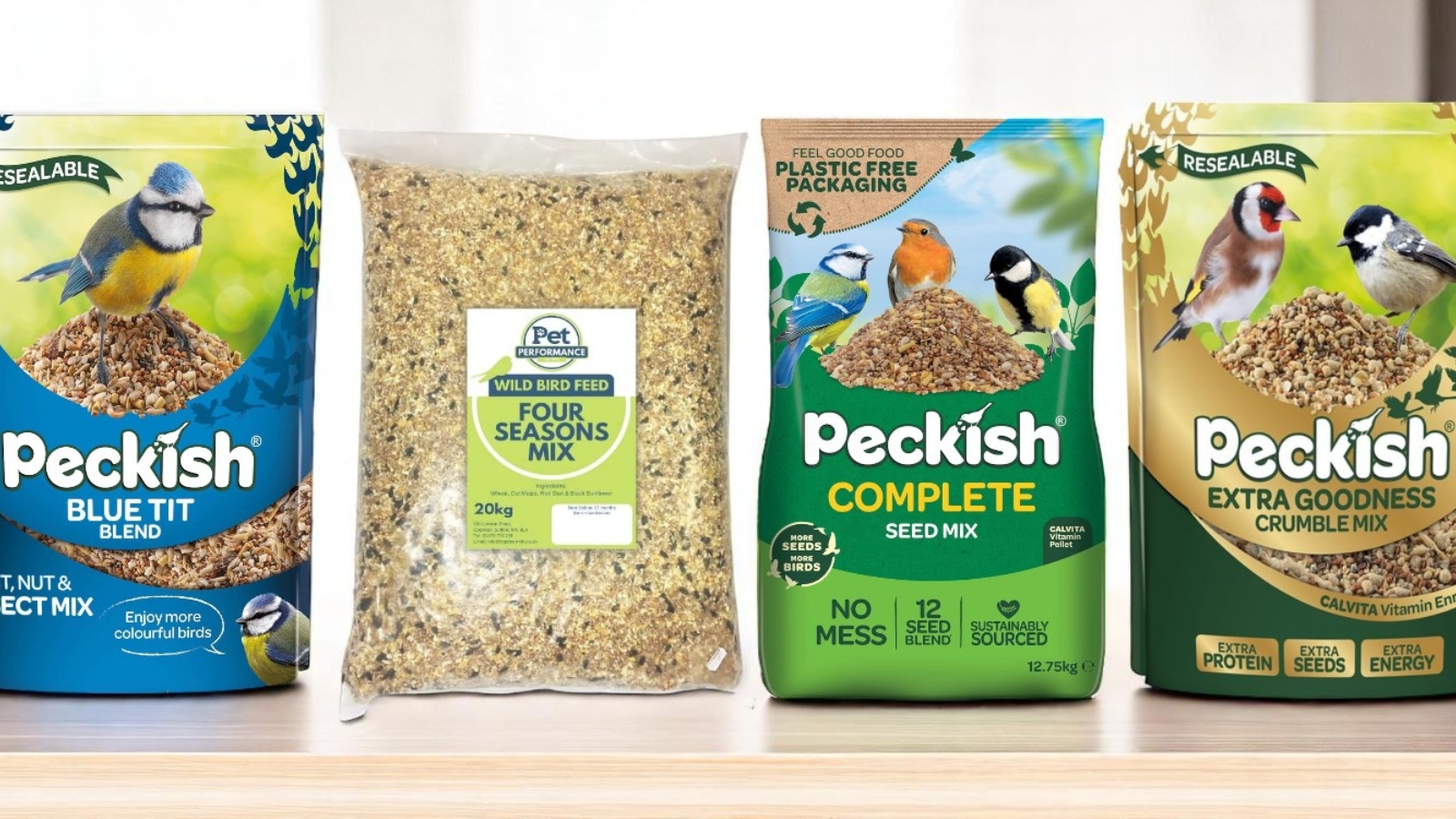Bringing house sparrows to your garden starts with the right food. These small, sociable birds can become regular visitors if you provide them with their favourite seeds. While their numbers have declined in recent years, offering suitable food can help support local sparrow populations and bring life to your outdoor space.
Key Takeaways
- House sparrows prefer white millet, sunflower hearts, and various small grains
- No-mess seed mixes reduce waste and discourage unwanted pests
- Year-round feeding requires different seed formulations for changing seasons
- High-energy seeds and suet ingredients are vital during cold winter months
- The quality of bird seed directly impacts which bird species will visit your garden.
Our Top 10 Bird Seeds for House Sparrows
- Peckish Complete Seed & Nut No Mess Mix
- Copdock Mill Wild Supreme Mix
- Peckish Extra Goodness Crumble Mix
- Extra Select Premium Wild Bird Food
- Sunflower Hearts & Chips for Wild Birds
- Pet Performance All Season Bird Seeds
- Wild Bird Food 20kg
- Bird Seed for Small Garden Birds
- Peckish Natural Balance Bird Food
- Peckish Blue Tit Bird Seed.
What House Sparrows Actually Eat
Before picking a bird seed mix, it helps to understand what these feathered visitors naturally prefer. House sparrows are primarily seed eaters with specific tastes and nutritional needs.
In the wild, sparrows search for smaller seeds from grasses and weeds. They also eat grains like wheat, barley and oats when available. During breeding season, they switch to more protein-rich foods, including small insects and larvae, which they also feed to their young.
The perfect sparrow feed mimics this natural diet, offering a variety of small seeds, grains, and occasionally supplemental protein. These birds particularly favour:
- White millet (a strong favourite)
- Sunflower hearts (easier to eat than whole sunflower seeds)
- Cracked corn
- Various grains, including wheat and oats.
- Safflower seeds.
Now let’s look at the best options available for attracting these chatty garden visitors.
Top 10 Bird Seeds for House Sparrows – Quick Comparison
| Rank | Product Name | Key Ingredients | Best Feature | Package Size | Price Range |
|---|---|---|---|---|---|
| 1 | Peckish Complete Seed & Nut No Mess Mix | Wheat, Millet, Sunflower Hearts | No-mess formula with husked seeds | 12.75kg | £££ |
| 2 | Copdock Mill Wild Supreme Mix | Wheat, Maize, Sunflower Seeds, Peanuts | Year-round complete nutrition | 20kg | £££ |
| 3 | Peckish Extra Goodness Crumble Mix | Wheat, Oats, Beef Tallow, Millet | High-protein crumble texture | 1kg | ££ |
| 4 | Extra Select Premium Wild Bird Food | Wheat, Sunflower, Millet, Nyger Seed | Higher percentage of premium ingredients | 3kg | ££ |
| 5 | Sunflower Hearts & Chips | 100% Sunflower Hearts and Chips | Single-ingredient, high energy | Varies | £££ |
| 6 | Pet Performance All Season Seeds | Wheat, Millet, Sunflower Seeds | Good value year-round option | Varies | £ |
| 7 | Wild Bird Food 20kg | Wheat, Maize, Dari, Millet | Bulk economy option | 20kg | ££ |
| 8 | Bird Seed for Small Garden Birds | Millet, Canary Seed, Niger Seed | Specifically sized for small birds | Varies | ££ |
| 9 | Peckish Natural Balance Bird Food | Natural Grains, Seeds, Vitamins | Nutritionally balanced formula | 12.75kg | £££ |
| 10 | Peckish Blue Tit Bird Seed | Sunflower Hearts, Peanut Granules | Small seed size ideal for sparrows | Varies | ££ |
Price Guide: £ = Economy, ££ = Mid-range, £££ = Premium
Detailed Review of Top 10 Bird Seeds for House Sparrows
1. Peckish Complete Seed and Nut No Mess Mix
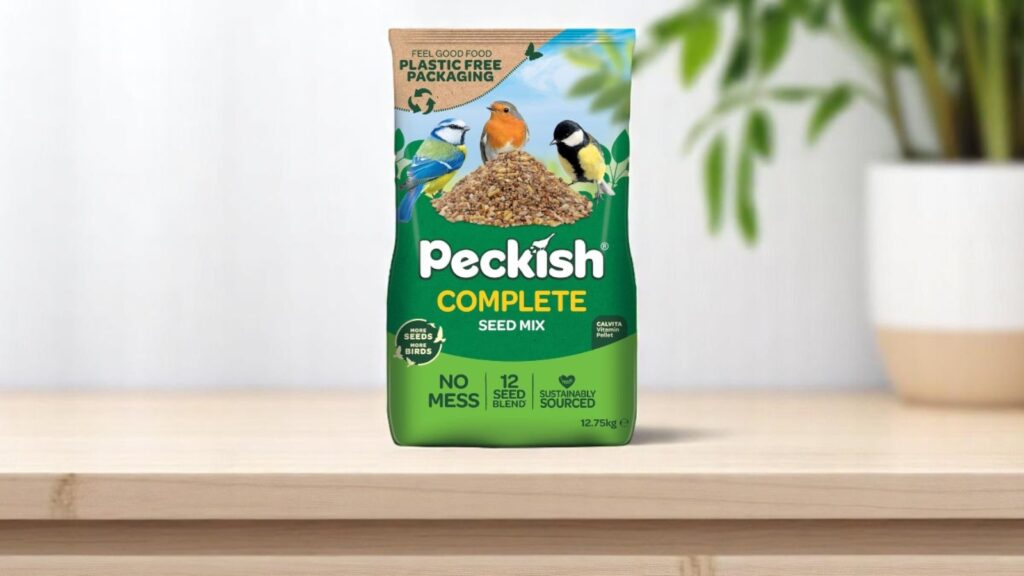
The Peckish Complete Seed & Nut No Mess Mix earns the top spot for good reason. This premium mix contains 12 different ingredients that house sparrows absolutely love.
Key ingredients: Kibbled Wheat, Red Millet, Red Dari, Kibbled Maize, Sunflower Hearts (7%), Flaked Naked Oats, White Millet, Naked Oats, Safflower, Pinhead Oats, Black Sunflower Seeds, plus added vitamins.
What makes this mix special is its no-mess formula. All seeds have had their husks removed, which means less waste under your feeders and less cleaning for you. This approach also prevents unwanted germination in your garden beds.
House sparrows particularly enjoy the white and red millet in this mix, along with the sunflower hearts that provide essential fats. The varied seed sizes cater to sparrows’ preference for smaller seeds while delivering a complete nutritional profile.
Best for: Gardeners who want to attract a wide variety of small birds while keeping their feeding area tidy.
2. Copdock Mill Wild Supreme Mix
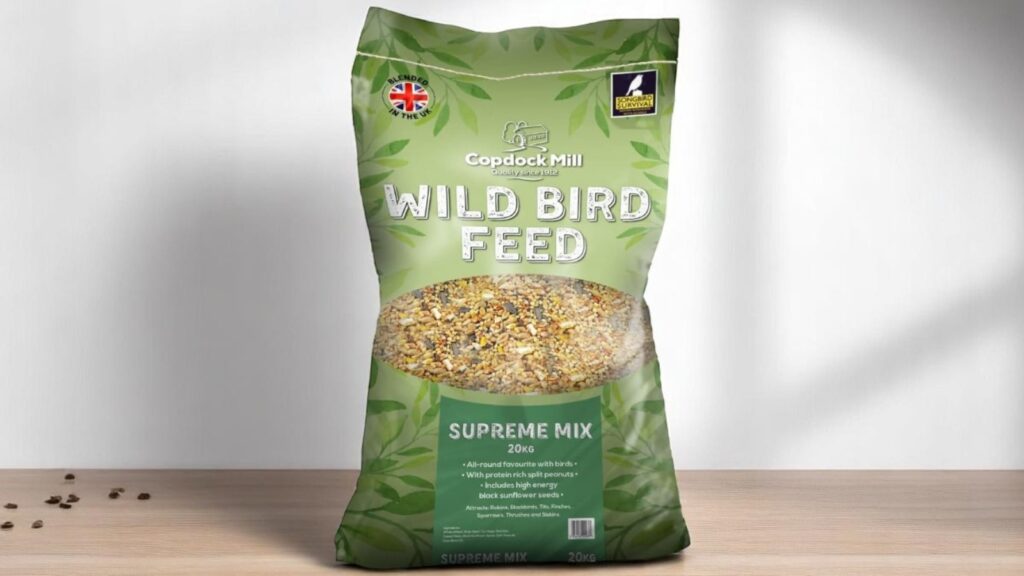
The Copdock Mill Wild Supreme Mix provides excellent year-round nutrition with its carefully selected ingredients.
Key ingredients: Whole Wheat, Base Seed, Cut Maize, Red Dari, Flaked Maize, Black Sunflower Seeds, Split Peanuts, Soya Bean Oil.
This mix stands out for its protein-rich split peanuts and energy-dense black sunflower seeds. The soya bean oil coating adds extra calories and helps seed stick together slightly, making it easier for smaller birds like house sparrows to feed effectively.
The variety of seed sizes ensures that house sparrows can easily handle the smaller components while still benefiting from the nutritional breadth of the entire mix. The wheat and maize components provide essential carbohydrates that sparrows need, especially during colder months.
Best for: Year-round feeding with an excellent variety of energy-rich seeds.
3. Peckish Extra Goodness Crumble Mix
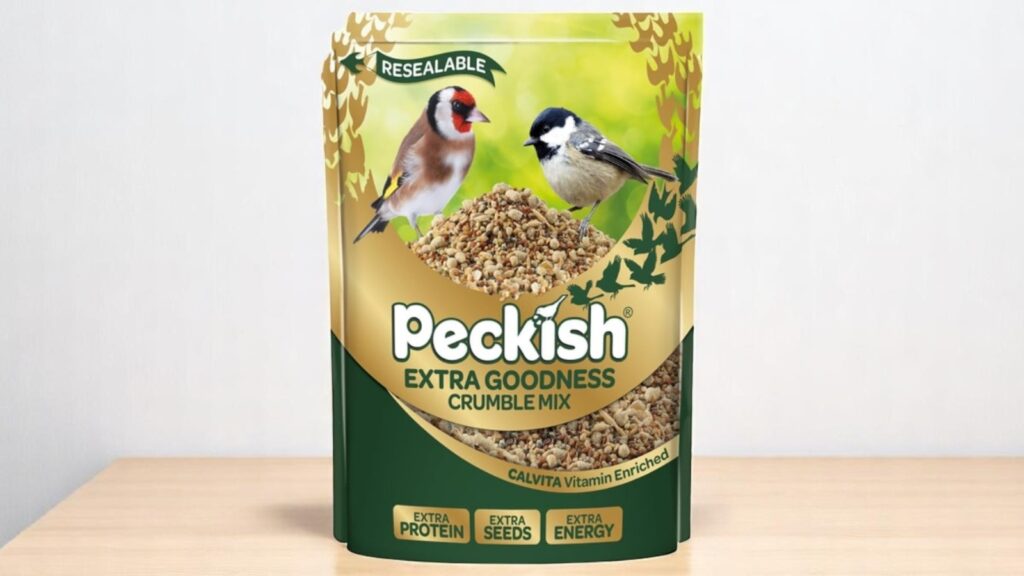
The Peckish Extra Goodness Crumble Mix offers a unique crumble texture that appeals to house sparrows.
Key ingredients: Kibbled wheat, naked oats, peanut flour, wheat flour, beef tallow, suet pellet, yellow millet, red dari, kibbled beans, black rapeseed, red millet, linseed.
What sets this mix apart is its formulation with high-energy beef tallow and peanut flour. This blend provides 25% more protein than standard seed mixes and twice the oils and fats of regular feeds. The crumble texture makes it easy for smaller birds like sparrows to eat and digest.
The inclusion of both yellow and red millet satisfies sparrows’ strong preference for these seeds, while the suet components provide essential fats that help birds maintain energy, especially in colder weather.
Best for: Winter feeding when sparrows need higher caloric intake and additional fats.
4. Extra Select Premium Wild Bird Food
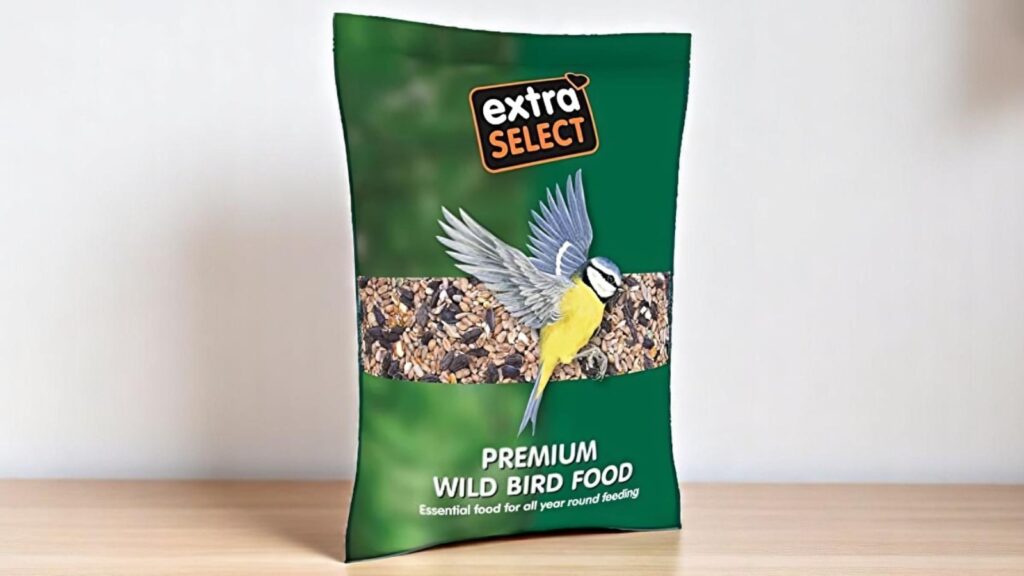
The Extra Select Premium Wild Bird Food offers a well-balanced mix with a higher percentage of premium ingredients.
Key ingredients: Wheat, black sunflower, cut maize, white millet, kibbled split peas, red millet seed, nyger seed, sunflower hearts, vegetable oil.
This mix features a high percentage of sunflower hearts, which are particularly valuable for house sparrows as they provide easily accessible nutrition without the need to crack shells. The combination of white and red millet appeals directly to sparrows’ preferences.
The addition of nyger seed, though not a primary food for house sparrows, adds nutritional variety and will attract other garden birds like goldfinches, creating a more diverse feeding station. The vegetable oil coating adds calories and helps smaller seeds stick together for easier feeding.
Best for: Gardeners wanting a premium mix with higher nutritional value than basic blends.
5. Sunflower Hearts and Chips for Wild Birds
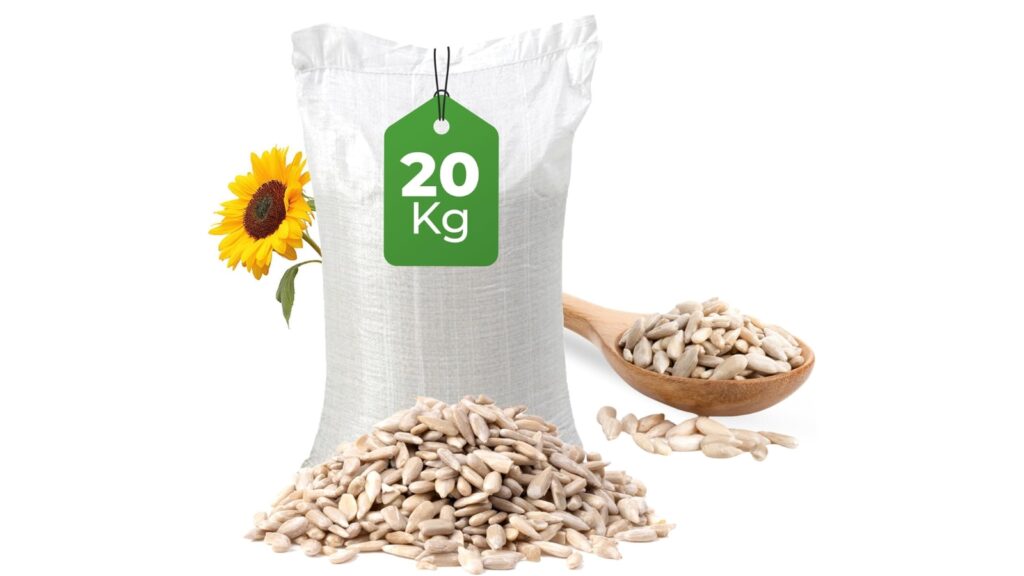
Sunflower Hearts & Chips for Wild Birds provides a single-ingredient option that’s highly nutritious and mess-free.
Key ingredients: 100% sunflower hearts and chips (kernel pieces).
While not a mixed seed product, sunflower hearts deserve a place on this list because they’re exceptionally nutritious for house sparrows. The absence of shells means birds can consume more food with less effort, and there’s virtually no waste under feeders.
Sunflower hearts are rich in oils and fats that provide essential energy for house sparrows. The smaller chip pieces are particularly suitable for sparrows’ smaller beaks compared to whole hearts.
This product is particularly useful when mixed with other seeds or used as a high-value supplement to a standard seed mix.
Best for: Creating a high-energy, no-waste feeding station or enhancing other seed mixes.
6. Pet Performance All Season Bird Seeds
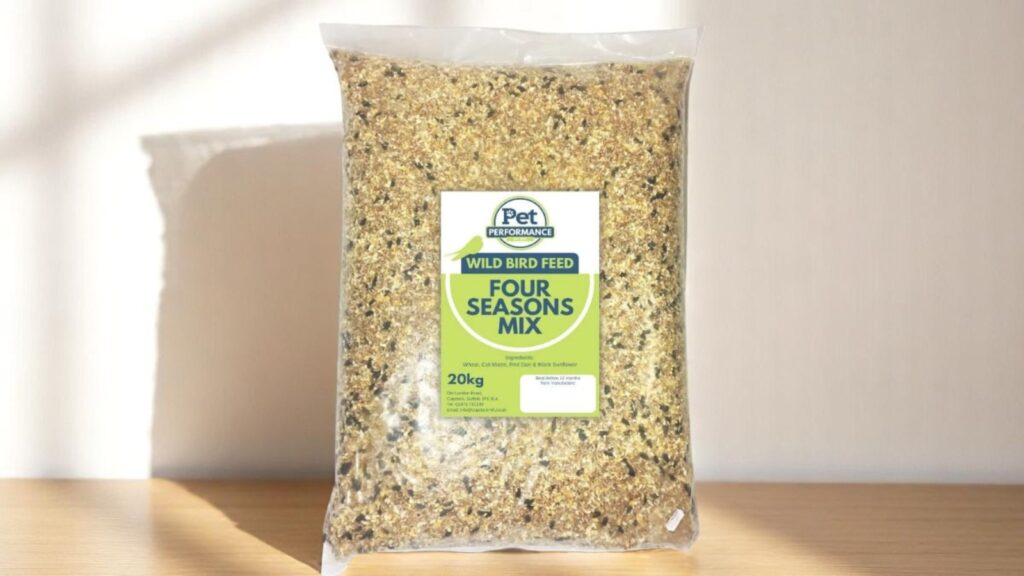
The Pet Performance All Season Bird Seeds provides reliable year-round nutrition at a reasonable price point.
Key ingredients: Wheat, millet, sunflower seeds, cracked maize, and other grains.
This all-season mix provides a good balance of ingredients that will attract house sparrows throughout the year. The inclusion of millet particularly appeals to these birds, while the sunflower seeds add essential fats and oils.
The mix offers good value for money compared to some premium brands while still delivering solid nutritional content. Its formulation ensures that it remains suitable regardless of seasonal changes.
Best for: Budget-conscious bird feeders who still want quality nutrition for their garden visitors.
7. Wild Bird Food 20kg
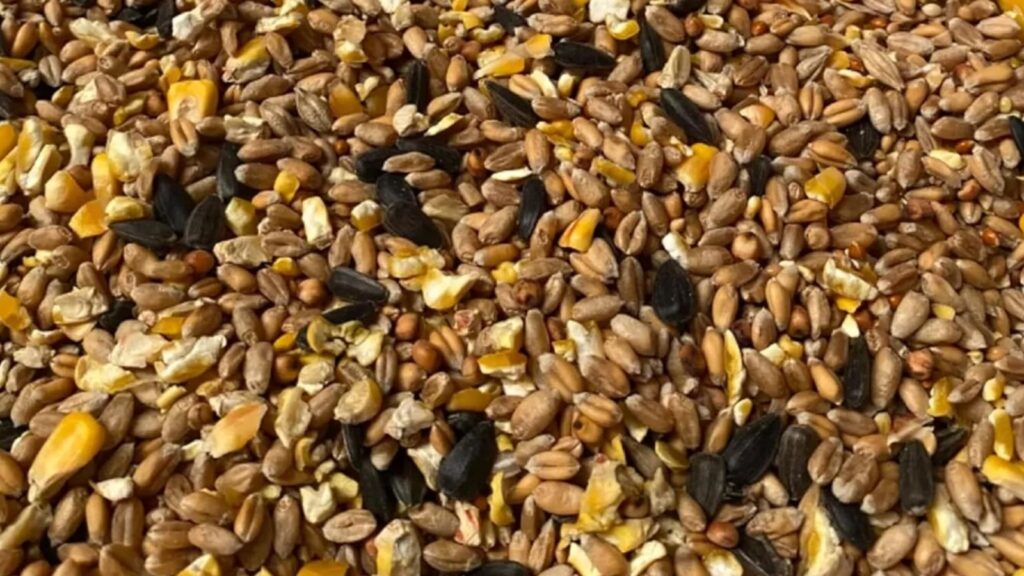
The Wild Bird Food 20kg bag offers excellent value for those feeding larger numbers of birds.
Key ingredients: Selected homegrown small grain wheat, cut maize, red dari, black sunflowers, various millets with aniseed oil.
This bulk option contains many essentials that house sparrows enjoy, particularly the millets and small grains. The aniseed oil adds a light scent that can attract birds while providing additional calories.
While not as premium as some other mixes, this bulk food provides a good foundation for garden bird feeding. The large bag size makes it economical for regular feeders who go through substantial amounts of seed.
Best for: Those feeding numerous birds regularly who need a good basic mix in bulk quantities.
8. Bird Seed for Small Garden Birds
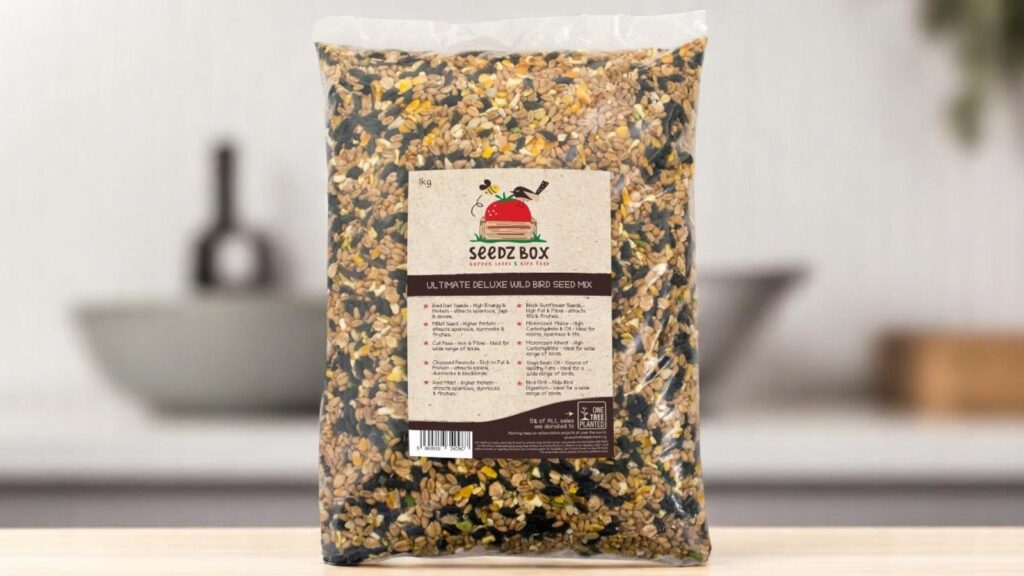
Bird Seed for Small Garden Birds is specifically formulated with smaller species like house sparrows in mind.
Key ingredients: Premium mix of small seeds including millet, canary seed, and niger seed along with smaller pieces of sunflower hearts.
This mix stands out because the seed size has been carefully selected to suit smaller birds like house sparrows. The smaller seed dimensions mean sparrows can easily handle and consume the food without struggling with oversized components.
The focus on smaller birds means this mix won’t attract larger, potentially dominating species as readily, giving sparrows a better chance to feed without competition.
Best for: Gardens where small birds like house sparrows need protection from competition with larger species.
9. Peckish Natural Balance Bird Food
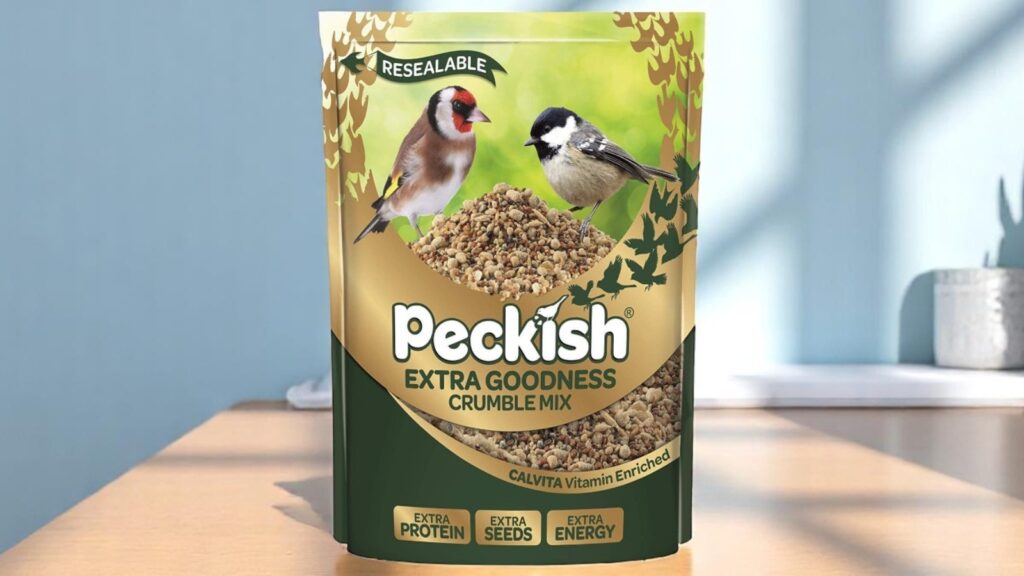
Peckish Natural Balance Bird Food offers a nutritionally balanced formula with natural ingredients.
Key ingredients: A variety of natural grains and seeds including millet, sunflower hearts, and wheat, enriched with vitamins and minerals.
This mix focuses on providing comprehensive nutrition with a balance of proteins, fats, and carbohydrates. The natural formulation avoids artificial additives while ensuring birds receive the nutrients they need.
House sparrows benefit from the balanced approach, which mimics the varied diet they would seek in the wild. The vitamin enrichment helps support overall health, particularly during breeding seasons when nutritional demands increase.
Best for: Health-conscious bird feeders who want to provide optimal nutrition without artificial additives.
10. Peckish Blue Tit Bird Seed
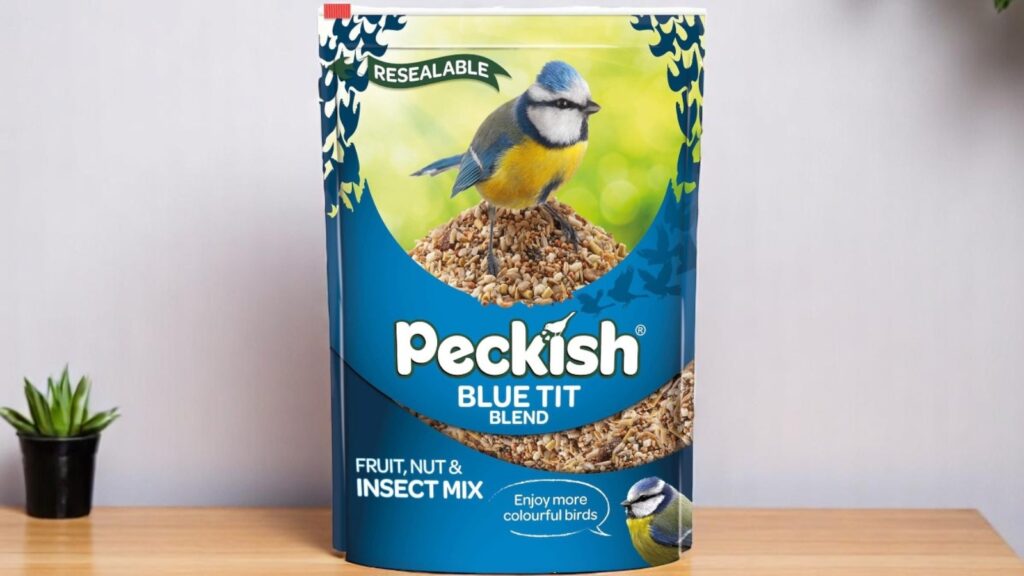
While designed primarily for blue tits, Peckish Blue Tit Bird Seed works wonderfully for house sparrows too.
Key ingredients: Sunflower hearts, peanut granules, and other small seeds suitable for smaller garden birds.
This specialised mix contains appropriately sized seeds that work well for house sparrows’ smaller beaks. The high percentage of sunflower hearts provides essential fats without requiring birds to crack shells.
The nutrition profile supports both blue tits and house sparrows, making this an excellent choice for gardens where both species visit. The smaller seed size prevents wastage as sparrows can handle all components of the mix.
Best for: Mixed feeding stations where both tits and sparrows are regular visitors.
Nutritional Comparison – What House Sparrows Need
| Bird Seed Type | Protein Content | Fat Content | Fiber Content | Best Season | Mess Level | Attracts Other Species |
|---|---|---|---|---|---|---|
| Millet-based Mixes | Medium | Low | Medium | Year-round | Low | Finches, Doves |
| Sunflower Heart Mixes | High | High | Low | Winter/Spring | Very Low | Tits, Finches |
| Cracked Corn Mixes | Low | Medium | Medium | Winter | Medium | Pigeons, Doves |
| Wheat-based Mixes | Medium | Low | High | Year-round | Medium | Many Ground Feeders |
| Premium No-Mess Mixes | High | High | Medium | Year-round | Very Low | Most Garden Birds |
| Suet-enriched Mixes | High | Very High | Low | Winter | Medium | Woodpeckers, Tits |
| Niger Seed Mixes | High | Very High | Low | Year-round | Low | Goldfinches, Siskins |
| Economy Wild Bird Mixes | Low | Low | High | Summer | High | Many Ground Feeders |
| Single Ingredient (e.g., Sunflower) | Varies | High | Low | Winter | Varies | Various |
| Specialist Small Bird Mixes | Medium | Medium | Low | Year-round | Low | Tits, Finches |
How to Choose the Right Bird Seed for House Sparrows
When selecting bird seed for house sparrows, consider these important factors:
Seed Size Matters
House sparrows have relatively small beaks compared to some garden birds. They prefer:
- Small to medium-sized seeds like millet
- Cracked or kibbled larger seeds rather than whole versions
- Husked seeds that don’t require extensive processing by the bird.
Nutritional Requirements Change Seasonally
- Spring/Summer: Include protein-rich components to support breeding season
- Autumn: Higher fat content helps birds prepare for winter
- Winter: Maximum caloric density with added suet or oils is essential for survival.
Consider Feeder Type
The best seed for house sparrows also depends on your feeder design:
- Platform feeders work well with mixed seeds
- Tube feeders require smaller, free-flowing seed
- Ground feeding is natural for sparrows, but requires seeds that won’t quickly spoil.
Feeder Compatibility for Different Seed Types
| Seed Type | Platform Feeder | Tube Feeder | Window Feeder | Ground Feeding | Mesh Feeder | Suet Cage |
|---|---|---|---|---|---|---|
| Mixed Seeds (standard) | ✓✓✓ | ✓✓ | ✓✓ | ✓✓✓ | ✗ | ✗ |
| No-Mess Mixes | ✓✓✓ | ✓✓✓ | ✓✓✓ | ✓✓ | ✓ | ✗ |
| Sunflower Hearts | ✓✓✓ | ✓✓✓ | ✓✓✓ | ✓✓ | ✓✓ | ✗ |
| Millet | ✓✓✓ | ✓✓ | ✓✓ | ✓✓✓ | ✗ | ✗ |
| Cracked Corn | ✓✓✓ | ✓ | ✓ | ✓✓✓ | ✗ | ✗ |
| Nyjer/Thistle | ✓ | ✓✓ | ✓ | ✗ | ✓✓✓ | ✗ |
| Crumble Mixes | ✓✓✓ | ✓✓ | ✓✓ | ✓✓ | ✗ | ✗ |
| Suet Pellets | ✓✓✓ | ✓ | ✓ | ✓✓ | ✗ | ✓✓✓ |
| Whole Peanuts | ✓✓ | ✓ | ✗ | ✓ | ✓✓✓ | ✓ |
| Peanut Granules | ✓✓✓ | ✓✓ | ✓✓ | ✓✓ | ✓ | ✗ |
Key: ✓✓✓ = Excellent, ✓✓ = Good, ✓ = Usable, ✗ = Not Recommended
Tips for Feeding House Sparrows
- Consistent supply: House sparrows form feeding habits and will return regularly if food is reliable
- Fresh is best: Replace seed every few days, especially in wet weather
- Clean feeders regularly: Prevent disease spread by cleaning feeding stations weekly
- Multiple feeding stations: Reduce competition by providing several feeding points
- Water source: Always provide fresh water alongside food sources
- Protect from predators: Position feeders where sparrows have clear visibility and quick escape routes.
Seasonal Feeding Guide for House Sparrows
| Season | Best Seed Types | Protein Need | Fat Need | Feed Frequency | Special Considerations |
|---|---|---|---|---|---|
| Spring (Breeding) | Millet, Protein-enriched mixes | Very High | Medium | Multiple times daily | Add mealworms if possible |
| Summer | Standard mixes, Millet | Medium | Low | 1-2 times daily | Provide fresh water |
| Autumn | Energy-rich mixes | Medium | High | 1-2 times daily | Gradually increase fats |
| Winter | Suet-enriched, Sunflower hearts | Medium | Very High | Multiple times daily | Early morning/late afternoon feeds important |
Value for Money Comparison
| Product | Approx. Price/kg | Feeding Days (Small Flock) | Waste Level | Quality of Ingredients | Overall Value Rating |
|---|---|---|---|---|---|
| Peckish Complete Seed & Nut No Mess Mix | £2.50/kg | 15-20 days | Very Low | Premium | ★★★★☆ |
| Copdock Mill Wild Supreme Mix | £1.75/kg | 10-15 days | Medium | Good | ★★★★★ |
| Peckish Extra Goodness Crumble | £4.00/kg | 5-7 days | Low | Premium | ★★★☆☆ |
| Extra Select Premium Wild Bird Food | £3.00/kg | 12-15 days | Low | Premium | ★★★★☆ |
| Sunflower Hearts & Chips | £4.50/kg | 15-20 days | Very Low | Premium | ★★★★☆ |
| Pet Performance All Season Seeds | £1.50/kg | 8-12 days | Medium | Standard | ★★★★☆ |
| Wild Bird Food 20kg | £1.00/kg | 8-10 days | High | Basic | ★★★☆☆ |
| Bird Seed for Small Garden Birds | £3.25/kg | 12-15 days | Low | Good | ★★★★☆ |
| Peckish Natural Balance | £2.75/kg | 10-15 days | Medium | Premium | ★★★★☆ |
| Peckish Blue Tit Bird Seed | £3.50/kg | 12-15 days | Low | Premium | ★★★☆☆ |
Final Thoughts
House sparrows may be common birds, but their numbers have declined significantly in recent decades. Providing quality bird seed helps support local populations while bringing life and activity to your garden.
The best seed mixes for house sparrows contain a variety of small seeds with millet and sunflower hearts featuring prominently. No-mess mixes offer convenience and reduce waste, while seasonal adjustments to fat and protein content help these birds thrive year-round.
Whether you choose a premium mix like the Peckish Complete Seed & Nut No Mess Mix or a bulk option like the Wild Bird Food 20kg bag, consistency in supply is key to establishing your garden as a reliable feeding station for these sociable birds.
By understanding and catering to the specific preferences of house sparrows, you’ll not only attract these charming birds to your garden but also make a small but meaningful contribution to their conservation.
If you’ve found this guide helpful, please share it with fellow garden bird enthusiasts who might also want to welcome these chirpy visitors to their outdoor spaces!
Frequently Asked Questions
Q: What is the best type of bird seed for house sparrows?
A: The best bird seed for house sparrows contains white millet, sunflower hearts, and small grains. House sparrows have relatively small beaks and prefer seeds they can easily handle. No-mess mixes like Peckish Complete Seed & Nut Mix are particularly effective as they contain pre-husked seeds that sparrows can consume efficiently without wasting energy cracking shells.
Q: How often should I refill my bird feeders for house sparrows?
A: You should aim to refill feeders for house sparrows every 2-3 days in normal conditions, and daily during winter months. House sparrows are creatures of habit and prefer reliable food sources. Maintaining consistent feed availability will encourage them to make your garden a regular stopping point. Always check feeders during cold or wet weather when birds need more energy and food can spoil more quickly.
Q: Do house sparrows eat from ground feeders or hanging feeders?
A: House sparrows naturally feed both on the ground and from elevated positions. They’re comfortable using platform feeders, tube feeders, and ground feeding areas. For best results, provide food in multiple locations and formats. Ground feeding is particularly natural for sparrows, but elevated feeding stations provide better protection from predators and keep seed drier during wet weather.
Q: Why are house sparrows not coming to my feeders?
A: If house sparrows aren’t visiting your feeders, it may be due to unsuitable seed type, feeder placement, nearby predators, dirty feeders, or lack of consistency. Try switching to a millet-rich mix, moving feeders to a location with nearby cover but good visibility, cleaning feeders regularly, and maintaining a consistent feeding schedule. It can take several weeks for sparrows to discover and trust a new feeding station.
A: Mid-range bird seed mixes often offer the best value for feeding house sparrows. Premium mixes like no-mess varieties reduce waste and provide higher nutritional value, but budget options can be effective if you choose ones with suitable ingredients like millet and small grains. The most important factor is selecting a mix with appropriate seed sizes and preferred ingredients rather than strictly adhering to price points.
Q: Should I feed house sparrows differently in winter compared to summer?
A: Yes, house sparrows have different nutritional needs across seasons. In winter, provide higher fat content seeds and suet-enriched mixes like Peckish Extra Goodness Crumble to help them maintain body heat. In summer, standard seed mixes with millet are suitable. During breeding season (spring), protein-rich foods help support reproduction and raising young. Always ensure a fresh water source is available year-round.
Q: How can I stop larger birds from taking food meant for house sparrows?
A: To discourage larger birds and favour house sparrows, use cage-style feeders with small openings, choose small seed sizes that larger birds find less appealing, or install sparrow-specific feeders. Placing some feed in narrow areas where only smaller birds can access it can also help. Offering multiple feeding stations spread around your garden will reduce competition and allow sparrows to find their own space.
Q: Are house sparrows considered pests or beneficial garden birds?
A: While house sparrows have sometimes been considered pests due to their adaptability and large numbers, they’re now experiencing population decline in many regions and benefit from garden feeding. They provide natural pest control by eating insects during breeding season and help pollinate some garden plants. Supporting house sparrows through appropriate feeding contributes to maintaining biodiversity in urban and suburban environments.
Q: How can I tell if my bird seed is fresh and of good quality?
A: Good quality bird seed should look clean, smell fresh (not musty or sour), and be free from excessive dust, debris, or clumping. Look for intact seeds without excessive broken pieces or empty husks. Seeds should appear vibrant in colour, not faded or grey. Store-bought seeds should have a clear use-by date and be stored in a cool, dry place in an airtight container to maintain freshness longer.
Q: Is it harmful to suddenly stop feeding house sparrows?
A: Abruptly stopping a regular feeding routine can be challenging for house sparrows, particularly during harsh weather or breeding season when natural food may be scarce. If you need to discontinue feeding, gradually reduce the amount over 1-2 weeks to allow birds time to locate alternative food sources. If you’re going away temporarily, consider asking a neighbour to continue the feeding schedule or use slow-release seed feeders.
